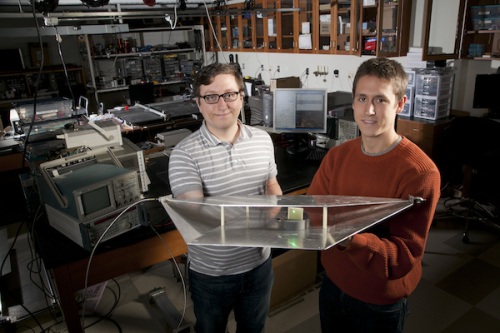If you’ve just embarked on your engineering education, just set out into the workforce, or even if you’re an old-time engineer, here’s some advice that we’ve collected from engineers in the field and engineering professors from various industries and universities.

If you’re not an engineer and have no desire to become one, that’s ok too. The advice seems to apply to all of us.
1. You need passion
This is true for all career paths. If you’re going to do something, it’s always best to love what you do.
David Brady, Professor, Imaging and Spectroscopy, Duke University:
Aspiring engineers should be passionate about creating something or solving a problem.
Gisele Bennett, Director of Electro-Optical Systems Laboratory, Georgia Tech:
Have passion and curiosity with your endeavors (and try not to violate the laws of physics).
2. Communication skills are most important
When you think of engineering, you probably assume it’s all technical and you need to focus heavily on your math and science skills. Surprisingly, a lot of engineers say that your communication skills are of the utmost importance.
Jatin Mehta, Senior Electrical Engineer, Lockheed Martin Missiles and Fire Control:
Communication skills are equally, or perhaps even more, important than any technical skills you may possess.
Being able to effectively communicate complex technical ideas to non-technical peers is a very valuable skill.
Pamela Bhatti, Assistant Professor, Georgia Tech:
Written and oral presentation skills are extremely important.
3. Keep the focus in your undergraduate years
While it seems easier to run with the herd and simply have lots of fun while attaining your undergraduate degree, many engineers advise against this if you’re headed for success.
George Swenson, Professor of Electrical and Computer Engineering, University of Illinois:
Your undergrad years are precious; stick to business and make the most of your opportunities for learning.
It’s difficult to understand the next level of education, without paying attention in the moment.
Abigail Kuchan, Lockheed Martin Engineer:
With engineering, you need to understand what you’re learning because the next thing you learn will inevitably build on that.
Jeremiah Schneider, Electronics Engineer Staff, Lockheed Martin Space Systems Company:
The enjoyment of math and science, endless tinkering, problem solving, the desire to make things work are characteristics of an engineer who will enjoy his or her career. If that doesn’t sound like you, think long and hard if engineering is really the right path for you.

Engineering students from Michigan University.
4. Get an internship and build a network
Carter Burks, Senior Electrical Engineer, Lockheed Martin Missiles and Fire Control:
Personal contacts and advocates within the company to call upon when you graduate are priceless. It’s an easy way of pulling your resume to the top.
Check out your university’s internship and job opportunity resources for more information.
5. Don’t define yourself by your major
Brian Foy, Lockheed Martin Engineer:
Engineering problems in the real world are always multidisciplinary, so it’s important to branch out and learn subjects outside of your discipline.
6. Always, always continue to learn
Tom Byrd, Lockheed Martin Fellow, Lockheed Martin Missiles and Fire Control:
When I graduated from college I thought I wanted to be an Application-specific integrated circuit (ASIC) designer. During my first couple of work assignments, I really saw that I enjoyed electrical power work, so I took a Power Electronics class and continued to learn while on the job.
Hal Babb, Lockheed Martin Fellow:
Attempt to develop proficiency in a language other than English. Foreign language proficiency is a real plus. You choose the language; hopefully one you can practice regularly.

Duke University students Alexander Katko and Allen Hawkes hold a waveguide that contains their power-harvesting metamaterial cell.
7. Think about the current market and focus on applications
Pamela Bhatti, Assistant Professor, Georgia Tech:
Always keep applications in mind as the field changes based on the applications driving the market.
8. Do not assume
Well, this one is true for everyone.
Martin Brooke, Associate Professor, Duke University Department of Electrical and Computer Engineering:
Try not to go into the field assuming too much. You will be blown away by the variety of careers out there for engineers.
9. Create a solid foundation
Phil Cheng, Systems Engineer, Lockheed Martin:
It is very useful at the start of one’s career to work on a product in which the engineer can get involved in the details, develop new skills and see the end results of their work quickly. From there, the engineer can expand to larger projects and eventually whole systems development.
10. It may be difficult, but it's rewarding
Indira Negi, New Devices Group, Intel Corporation:
It seems like a lot of work in the beginning, but it can really be a very creatively satisfying field. Once you've got the building blocks, you can create anything you can imagine!
If you have any other advice for engineers embarking on their career path, feel free to comment below.
Advertisement
Learn more about Electronic Products Magazine





